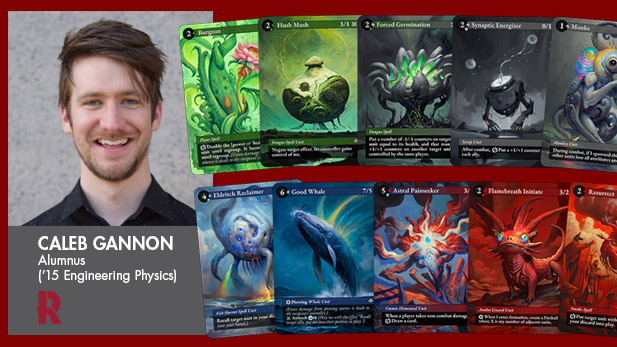Rose-Hulman Graduate Caleb Gannon Creates Successful Fantasy Card Game

Caleb Gannon, a 2015 engineering physics graduate, launched a Kickstarter campaign for his own unique, artistically designed card game, Algomancy.
When Rose-Hulman alumnus Caleb Gannon launched a Kickstarter campaign for his own unique, artistically designed card game, he had no idea it would be fully funded in 13 minutes. He also did not expect to raise more than $364,000 from over 4,000 backers when the goal was $15,000. Gannon, a 2015 engineering physics graduate, sees this success as proof that his creation is fulfilling an untapped need in the fantasy game industry.
Gannon’s creation is called Algomancy, which breaks down to magic (mancy) through algorithms (algo). The idea behind the game is it’s set inside a computer simulation, with the people inside not aware they are within that system. But the players feel the magic, which is a manipulation of code. Algomancy contains over 321 unique, full art game cards and 480 tokens/resources. Each player is an Algomancer vying for control over an AI simulation. By manipulating the source code of the world, the Algomancer can cast spells, summon armies, and augment game objects to modify their capabilities. Players use these Algomantic powers in a conquest to vanquish the opposition and become the last one standing.
Gannon, who was one of the founding members and vice president of the Magic Togethering Club during his time at Rose, has been a game player all his life. Most existing fantasy games are through the Magic: The Gathering cards. He wanted Algomancy to be unique in a variety of ways.
“The problem with most trading card games is they are so expensive,” said Gannon. “One card can go from $50 to a few thousand dollars. I want to play games with my friends, but we don’t have hundreds of dollars to play. With Algomancy, you get all the cards you need at once for $69.”
Algomancy is also unique in its global turn structure. Most card games have what’s known as a turn-based structure in which one player goes and then the other player goes, and so forth. In these instances, whomever goes first has an advantage. And in a game with ten players, for example, it would take a long time to finish because each player waits for the other to take their turn. With Algomancy, neither player goes first, which makes for more competitive playing and eliminates the first-turn advantage.
Gannon is currently in talks with manufacturing companies to produce the physical product and expects it to print and ship to Kickstarter backers in eight to ten months. While the Kickstarter campaign has ended, he is still accepting late pledges/orders. Once the game is manufactured, Gannon will sell direct to consumers through his website, as well as local game stores to support small businesses. He also plans to create an open source, digital client for Algomancy. He admits this will be a large coding endeavor but will allow for the game to be accessible to more people.
While Algomancy may be Gannon’s first endeavor into building a card game, he developed a large following by creating YouTube content around card games, mainly through Magic: The Gathering. Yet his path to creating digital content and physical games was not something he planned after graduating from Rose-Hulman. He moved to Arizona to earn a Ph.D. in optical sciences from University of Arizona. Gannon then worked for a start-up company doing ray tracing for nerve services and optical designs. It was during that time he found himself battling a chronic illness that required him to rethink his work commitments.
“As a hobby, I started a YouTube channel where I created strategic card game content,” said Gannon. “It was really the only thing I could do when I was sick. But I grew into one of the biggest content creators in my niche and it turned into a major part of my career.”
His YouTube channel — “Caleb Gannon MTG” — has around 30,000 subscribers and his videos have received more than 13 million views in total. He wrote and developed code and script to analyze and edit videos for his channel to take the burden off himself while he was sick. In turn, he started a second YouTube channel to educate users on how to do that work themselves.
He also began making digital, generative art that explored the way humans interact with computers. His artwork became popular that he sold it as a business endeavor. Once Gannon started feeling healthy again, he decided to combine his art skills, card game knowledge and education to go full time into card game development. Hence, the creation of Algomancy. All the game cards are designed by Gannon and his signature art.
While it’s been several years since Gannon left Rose-Hulman, he credits the college for helping build his career foundation and confidence.
“Rose gave me a really good, broad skill set and work ethic that’s been very influential in my career development,” said Gannon. “That work ethic helped me fight through chronic illness and make something good out of it.”